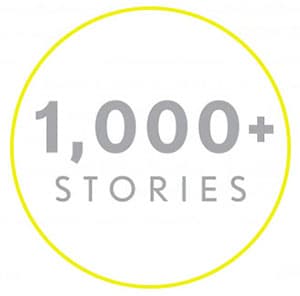This story is part of our 1,000 stories campaign. What’s your story?
Name: Yve-Car Momperousse
Business: Kreyol Essence, eco-luxury beauty products
Industry: Health & Beauty, Social Enterprise
Location: New York, New York, U.S.
Reason for starting: I started after a hair catastrophe. In 2008, after growing my hair naturally, I went to a hair dresser and asked to have my hair pressed. The Hairdresser took one look at my enormous afro and said “I am going to need significant heat to straighten that hair.” It turns out that the beautician burned my hair by using an iron that was too hot. The next day, when I washed my hair it all started to fall out.
I started to think about Haitian Black Castor Oi which is used as a tonic to solve all issues in the Haitian community. When I was a child, my mom used it on our hair. I went to natural and West Indian stores in Philadelphia in search of the product. To my dismay, no one had the organic oil available. I looked to purchase it online but all the products had Hexon bleech and other additives in it. I called my mom in Brooklyn to get some and we started talking about why it is so hard to get. When I researched online I discovered other women also looking for it and wondering why it was not locally available. I have a background of working with disenfranchised communities… So I starting looking at the social impact of starting this business. The methodology for creating this oil would allow me to give women in Haiti a paying wage. I could help the country’s GPD with the planting of raw materials and the production of caster oil, then the export of beauty products to larger affluent markets… this brought together my two passions – beauty products and social-entrepreneurship.
Related: Read about another Social Enterprise entrepreneur here.
How do you define success? Success to me is being able to dispel the notion that a social enterprise is not a real business and that you can achieve your business goals without sacrificing social goals. I was in Cornell eLab – a business accelerator program for student companies – and my company was the only social- enterprise there. Many people were wondering if I was accountable in the same way as they were, or if I used different metrics. Yes, absolutely! I am worrying about ROI and everything that the traditional business models are looking at to be profitable. Other metrics that we need to meet our business plan include: creating at least 300 jobs in Haiti that will pay 3-5 times above the market average wages ; training Haiti employees in business skills; number of plantings we do; number of products we produce for export (GDP); green-house gas emissions – all of these tie back to our business plan.
Biggest Success: We base our strategy on a concept that Cornell eLab taught – Minimal Viable Product (MVP) – which emphasizes that you move quickly and reiterate and grow as you go along. We worked with Kiva.org and the micro-financing giant Muhammed Yunus, founder of Grameen Bank and Yunus Social Business who is focusing on the US as an engine for the developing countries. They chose Kreyol Essence as a first company to raise $100K through crowd-sourcing… we put together a video with them and 48 hours later we had reached that goal!
Related: Still Writing That Business Plan? Here’s How to Finish
What is your top challenge and how have you addressed it? The fact that I am running an international business and I need to train staff remotely while I am in US is very challenging – especially getting everyone acclimated and used to the fact that we are working with staff members in different countries. So I am going to Haiti this summer to make sure people understand that although we are in two countries, we are one company and we all need to work together. We endeavor to tackle the socioeconomic disparities plaguing Haiti by developing a business model that benefits the country economically and environmentally. We believe prosperity lies in the power of business and organizing for self-sufficiency. As such, we will hire Haitian farmers, women and differently abled persons to grow and make our products. Over 40% of women are head of households in Haiti. As a company that caters to women it is only fitting for us to focus on women hires.
Who is your most important role model? My mother. When I started the business it was before the devastating earthquake in Haiti. On January 12, 2010 the earthquake happened and I thought I should put the business on hold and help in more traditional ways to provide emergency care and to rebuild communities working through traditional not-for-profit agencies. But my Mother said, “If you want to really help, I need you to think practically and realistically. When the next natural disaster strikes somewhere in the world the aid will decrease and attention to Haiti will diminish. Now more than ever, our people will need jobs and a way to be self-sufficient. Do not be overly emotional. Be sensible about what is the long term benefit of the contribution you can make. Continue to build your business.” Sheryl Sandberg, COO of facebook and author of Lean In and CEO of Wholefoods John Mackey who just wrote a book on conscious capitalism are also on my list of role models.
[box_light]Website www.kreyolessence.com
Facebook www.facebook.com/kreyolessence.com
Twitter @Kreyolessence[/box_light]
Tell us your story!
Read about another Health & Beauty entrepreneur here
Edited by The Story Exchange

